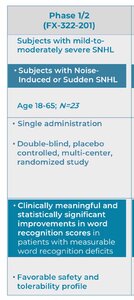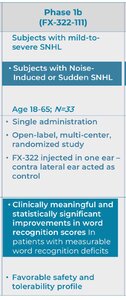I feel not everyone is understanding what's happening, here is an example:
Michael and Laura are desperate to get FX-322, so they both apply for the Phase 2a trials:
View attachment 45477
Michael in reality can hear 30 words out of 50, but as he is desperate, he fakes his initial screening to get into the trial by telling the doctor he can only hear 15 words out of 50.
Laura in reality can hear 35 words out of 50, but tells the doctor she can only hear 20 out of 50:
View attachment 45478
The doctor is happy he found good candidates for the trial. He gives Michael the placebo, and Laura gets the drug (FX-322):
View attachment 45479
After the trial is completed, the doctor gets the results:
View attachment 45480
The doctor saw that Laura improved! She used to hear 20 words out of 50 and now after getting the drug, she can hear 35 words out of 50! The doctor is happy!
Michael was never given the drug but also improved? Michael now hears 30 words out of 50.
So what does the doctor do now?
He basically just claims that Michael was a bias... and he is happy that Laura improved!

Are you guys getting the point?
Michael and Laura never improved, their real scores stayed the same the whole time.

 Member
Member


